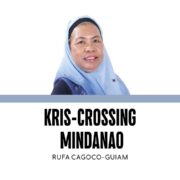Trial by social media

“Iskolar ng bayan” is a badge of honor usually associated with a graduate from the University of the Philippines. The term signifies not just the intellectual formation that one has received from a premier university, but also the civic responsibility that comes with an education that is funded by taxpayer money.
In the past few days, however, the term has taken on a more cynical meaning. Through Reddit threads, TikTok videos, and Facebook/Instagram posts, ordinary citizens have been calling out the extravagant lifestyles of different government officials and contractors who have been tied to anomalous flood control projects, claiming that their questionable wealth are from sham bids and backdoor deals. This includes the expensive university degrees their children obtained overseas, earning them the ironic label of “scholars ng bayan.”
Not too long ago, these political children were admired (even lauded) for the designer bags, luxury cars, and expensive jewelry they shared on their social media accounts. Many have made a career as influencers, posting from their private jets or their latest trips abroad. Once in a while, they would thank their parents for funding their lavish lifestyles, with one even calling her father her “never-ending ATM.”
Today, many of those accounts have been locked as private and are now hidden from public view. What used to be aspirational content is now considered incriminating, as anonymous users dig through old feeds and resurface photos with a detailed price breakdown of every item they own. One Reddit user even gave step-by-step instructions on how to retrieve deleted or archived posts, while another made a consolidated directory cataloguing all the gathered evidence/screenshots of each family’s “ill-gotten wealth.”
Before last week, many were quick to accept that some Filipino families simply existed at that level of wealth, rarely pausing to ask where the money came from. The harder truth that needs to be acknowledged is how we, as a society, helped normalize and collectively enabled the lifestyles of these political families. Filipinos have long gravitated toward celebrated displays of affluence. As the now-infamous Discaya features illustrate, media humanized these personalities through stories that framed their privilege as aspirational, while giving them a veneer of relatability. Social media followers strengthened their soft power through every like and share. Brands that collaborated with these individuals conferred status and credibility. Perhaps what is so important about this issue is not only the long-overdue scrutiny of these families, but also the uncomfortable recognition of our own complicity.
Political theorist Jürgen Habermas defined the public sphere as the realm where private citizens come together to debate matters of public concern. The past week is a good example of how social media platforms have effectively taken on that role. Despite being conducted in informal settings, this “trial by social media” could lead to real consequences for reputations, careers, and even government inquiries. For instance, public pressure has already reached the higher levels of government. President Marcos recently ordered a lifestyle check of government officials from the Department of Public Works and Highways and other agencies. When criticized about his own family’s wealth, the President said that he is more than willing to be subjected to a lifestyle check as well.
While I am not a big fan of the indiscriminating nature of cancel culture, the past few days have felt like a satisfying form of comeuppance. In an era of selective justice and seeming impunity, these Reddit threads are starting to feel like a legitimate way of pursuing accountability since formal mechanisms don’t always yield results. As one user noted, the hope is that this newfound determination to investigate and call out questionable practices will not be confined to flood-control contracts alone, but will extend to anomalous bids in health, education, and other public services.
Of course, this type of no-holds-barred tribunal is not without risk. While it can pierce impunity, it also blurs the line between accountability and mob justice. Whistleblowing on Reddit, and social media in general, relies heavily on anonymous or pseudonymous accounts. While it offers protection for the whistleblower, it can just as easily serve as a breeding ground for misinformation and harmful conspiracy theories to flourish.
And yet, we cannot dismiss the significant contributions it can make to advance public discourse. If the once seemingly invulnerable scions of political dynasties are now retreating from the spotlight, it means that those in power are feeling the weight of public scrutiny. Whether these viral posts and message threads will lead to an actual investigation and systemic reform, or simply to more careful curation of what these families share publicly, remains to be seen. But one thing is clear: more Filipinos are refusing to stay silent. The ongoing “trial by social media” of these officials’ extravagant lifestyles may be messy, flawed, and less than ideal, but it has definitely made the issue quite impossible to ignore.


















